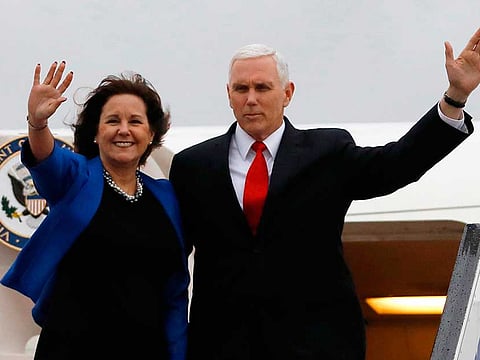Fables evangelicals in the US live by
Trump’s decision on occupied Jerusalem and Pence’s visit to Israel mark the culmination of an alliance between Christian Evangelicals and Israeli leaders

As one despondently contemplates Washington’s off-kilter and utterly cock-eyed stance on peace talks in the Middle East, one is reminded of an iconic cartoon in the New Yorker, where a book editor, sitting at his desk across from one of his writers, chastises the young man for the sloppy writing in his new manuscript.
“Mr Dickens, Mr Dickens”, the editor is captioned saying, “it can be the best of times or the worst of times, but it can’t be both!”
So let’s extrapolate here. The United States can be an even-handed peace broker or an Israeli advocate, but it can’t be both. Sadly, US President Donald Trump’s administration has effectively become a barrister retained by evangelicals, folks whose obsession with the “End Times”, or the “Rapture”, aligns well with Zionism’s dream of “Eretz Israel”.
These Evangelicals, or Zionist Christians, as they are known, are not by any means a fringe group in American political culture, operating on the fringes. They represent a large chunk of Trump’s base, a massive block of roughly 50 million voters, who are fixated on Israel.
By speaking with Evangelicals in their homes, conferences and, in one segment, during a tour of the Holy Land, award-winning director David Heilbroner intertwines Messianic Jewish and Christian Zionist perspectives to explore the unholy — and certainly bizarre — alliance between Evangelicals and Israel, and how that alliance has shaped US-Middle East relations. In an article he subsequently wrote for Huffington Post, Heilbroner warned against dismissing these people as a peripheral force in the US. “This is no small sect”, he averred. “Evangelicals control some 60,000 radio stations. They meet in 25,000-member megachurches and sit on school boards and legislatures across the country.”
And yes, lest we forget, the Vice-President of the US, Mike Pence, is an Evangelical Christian and, like other Evangelical Christians, is an ardent believer in the Rapture, for recall how his speech to the Knesset last week was steeped in Biblical references, attesting to the deep support for Israel — anchored in Evangelical tenets — at the White House. “America stands with Israel”, he hollered, “because America supports good over evil,” describing the Zionist entity in Palestine as “Abraham’s promised land, which, as it grows, reaches closer to heaven.”
This piffle elicited, well, shall we say, rapturous applause from the Knesset members.
Beyond their messianic preoccupation with Israel, lies a worrisome phenomenon: By taking Biblical violence and bloodshed to a new level, they have raised concerns among social critics in the country. New York Times columnist Nicholas Kristof saw red flags there. Harping on a bloody Second Coming, which these folks appear to pray for, he wrote mock-seriously, “reflects a shift in American portrayals of Jesus, from a gentle Mr Rogers to a martial messiah presiding over a sea of blood”.
They believe that the Book of Revelations, whence they get their cryptic messages about an End Times battle, predicts the setting for Armageddon as the Holy Land. Thus, for these Christian Zionists, absolute, blind support for Israel’s sovereignty over that entire land is mandatory, support that includes the demolition of the Dome of the Rock in order that the Third Jewish Temple can be rebuilt there.
In a scene from Waiting for Armageddon, an American preacher, surrounded by his flock of a dozen or so Evangelicals at the Dome of the Rock, says: “Let’s all pray that, dear Lord, a bomb shall fall here on this structure and obliterate it from earth.” My contention is that this pathology has less to do with Israel and more to do with a residue of the enmity that in Medieval times, on the eve of the Crusades, existed between Christiandom and Islam — an enmity that still resonates in the historical archetype of these people.
In a news report on the front page of the Washington Post last Monday, datelined occupied Jerusalem, we read: “For many, the beaming smiles on both sides during Vice-President Pence’s visit to [occupied] Jerusalem this past week embodied the love affair between American Evangelicals and Israel. The Trump administration’s decision to recognise [occupied] Jerusalem as Israel’s capital and the subsequent visit of the Evangelical vice-president to Israel mark the culmination of a long, complicated and sometimes uneasy alliance between Israeli leaders and Christian Evangelicals.”
It also marks a dangerous phase in the alliance between America itself and Christian Zionists. So forget, for now and for sometime to come, even-handed brokers and honest peacemakers planning a ceremony on the White House Lawn formalising a much-touted “deal of the century”.
Fawaz Turki is a journalist, lecturer and author based in Washington. He is the author of The Disinherited: Journal of a Palestinian Exile.


